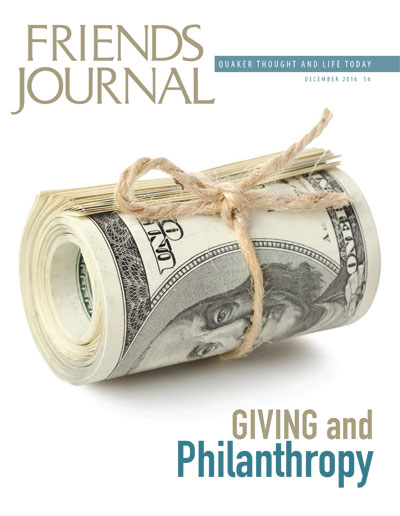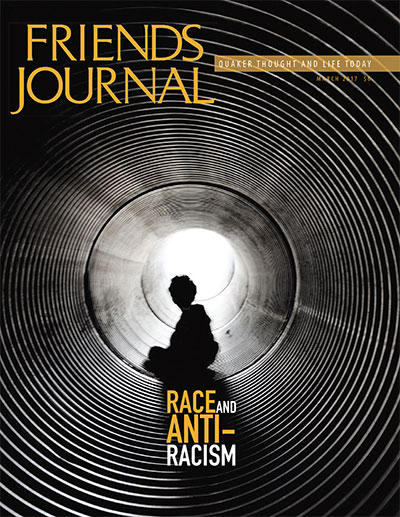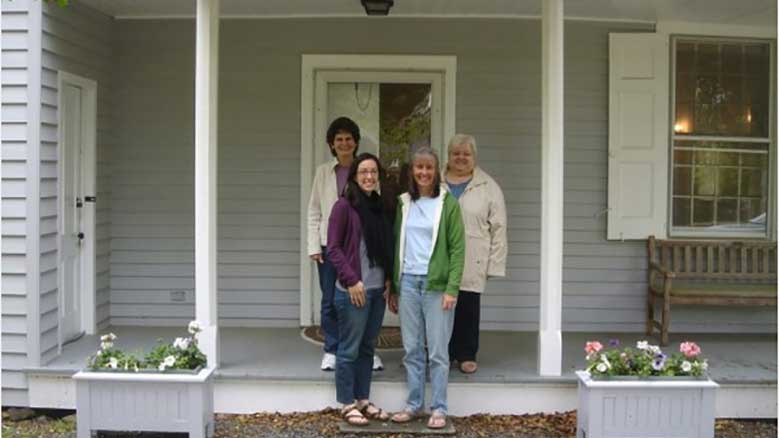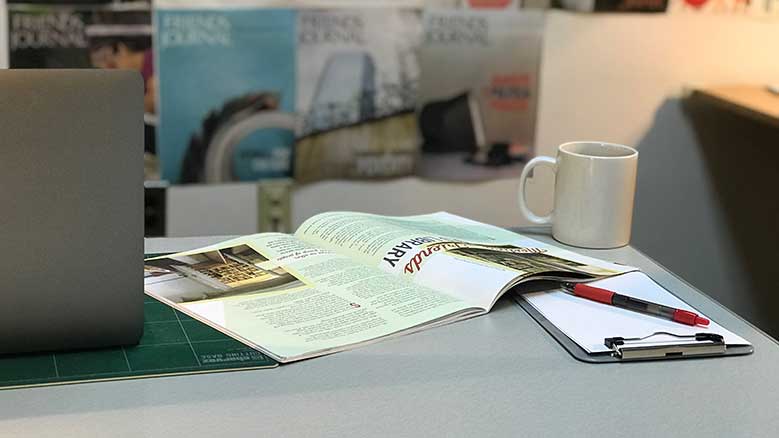Weathering the Windfall Contest
While we’re talking about giving and philanthropy, we’ve come up with a way to involve meetings in the discussion. It’s a contest that uses and celebrates Quaker process to determine the way meetings manage unexpected large gifts.
Prompt: A beloved elderly member has passed away, leaving a million dollars to the meeting. How do you manage the windfall?
To start, we suggest forming a small group of three to six people who would either role-play their answer or allow the participants to vocalize their opinions. We recommend having someone take notes of the discussion that follows, and incorporate the discussed ideas into the contest entry. We estimate this exercise will take one to two-and-a-half hours to complete, plus additional time for editing and submitting the final piece. Remember, this is only an exercise, and we hope Friends have fun imagining how this scenario might unfold in their own meetings, communities, and cities.
We’re less interested in the awesomeness of your final idea and more interested in the process you follow to get there. But yes, you should have a final answer for what you would do with the money. Using your imagination will be necessary to fill in the story, but it should also be realistic and believable.
Maybe yours is a meeting that has already gone through this process of deciding what to do with a large amount of money. If this is the case, please share with us what and how it happened.
Our panel of judges will evaluate the entries based on a list of guidelines. The winning meeting will get its own mini-windfall: a $500 cash prize. Runners-up will also receive prizes.
Deadline: January 31, 2017
More details: Friendsjournal.org/weathering-the-windfall-contest
Student Voices Project
The fourth annual Student Voices Project is underway! This year we’re asking students to write a letter to the next president of the United States: Donald J. Trump. As in past years, we welcome submissions from all middle school and high school students (Quaker and non-Quaker) at Friends schools and also Quaker students in other educational venues, such as public schools and homeschooling.
2016-2017 SVP Theme: Dear Mr. President
The President of the United States of America is the elected head of state and head of government of the United States. Our new President-elect will take office on January 20, 2017, for a four-year term. One of the most powerful positions in the world, the U.S. presidency comes with a great responsibility to represent and advocate for all the diverse citizens of this nation.
Prompt: Write a letter to President-elect Donald J. Trump suggesting what you think he should focus on during his first year. Below are some ideas for your letter.
- What is needed in your community that the president could help accomplish?
- What lessons have you learned at school that would help the president do his job?
- What issues should be given priority during the first year, and why?
- If you were president, what are three things you would do?
- Recommend a book that you think the president should read, and explain why.
- Pick a famous Quaker, and share two things about him or her that might inspire the next president.
Deadline: February 13, 2017
Instructions and details can be found at Friendsjournal.org/studentvoices.
Quakers and Indians
Thank you for Paula Palmer’s “Quaker Indian Boarding Schools” (FJ Oct.). I first learned about Indian boarding schools in 1980 when I took a job at an urban, Indian-run health clinic in Minneapolis. I had no idea that Quakers were once involved, but I am not too surprised.
I am a recently retired speech-language pathologist, and for me, a big contribution toward those healing processes has been to adapt my conversational interaction style with Indian people. When I began to work in Indian people, I learned to change the way I “talked.”
I learned that listening—and silent reflection—needed to become my primary conversational strategies. I had recently become a Quaker, so I was getting that message from several directions. In that setting, I learned a new link between communication and emotional healing.
Adapting my communication style to Native patterns of conversation helped both them and me to know that we were being listened to, and the nonverbal messages became more positive. I was touched when one day a Seminole elder wrote to thank my clinic for the way that my students and I interacted during a day of speech-language screenings. I have continued occasional contact with the Seminole tribe, and it is my turn to reach out.
Here are my basic principles for honest dialogue: I continue to approach each interaction the way I approach a meeting for worship; I keep in mind that listening and being present are more important than how much I talk. I remember what a chief once told John Woolman: “I love to hear where words come from.” I love to hear where words come from as well, so I listen.
Brian Humphrey
Wilton Manors, Fla.
I am grateful for this thoughtful and challenging article. I am ninth-generation Quaker in America, and although I became an ordained Presbyterian minister, I cherish and am profoundly grateful for my Quaker heritage. I am troubled (and need to be troubled!) by the historic ethnic relationships that challenged our ancestors. My father served a year at the Tunnasasa Indian School (1922), and my great-grand-uncle served many years in Kansas among Native Americans teaching agriculture.
There is no doubt that they understood the world in their timely “lens” just as we do today. I do not feel we need or must “apologize” for their being who they were, but I do agree that we today must learn from their experiences as best we can, and struggle to implement Christ’s teachings and values within our own lives as disciples. That certainly means seeking forgiveness for intentional and unintentional hurts and prejudices that we and ancestors have caused, and seeking each day to create and live within the new covenant of love and fellowship.
Art Stanley
South Hadley, Mass.
Unintended consequences with the best of intentions: Indian schools, solitary confinement, all of the racial harm. God forgive us for our arrogance, then and now. Open our eyes, ears, and hearts, so that we can see the harm we do, the hurt we inflict, and work to stop it now!
I am grateful for this article bringing this very disturbing piece of history into the Light. I for one am deeply sorry for the harm these Friends did.
Karen Stewart
Hillsborough, N.C.
My father’s family was Danish Lutheran; my mother was Church of the Brethren; and my stepmother was Catholic. I attended a Catholic boarding school in Boulder, Colo., with the loneliness and isolation any boarding school entails.
I could not understand why my father was so upset when I began attending Boulder Meeting in the mid-1960s. I understand his objections better now.
His stories, letters, and a great-aunt’s journal indicate he attended what had been Ignacio School (Fort Lewis), a mile or two from the family homestead. Although Ignacio was not an “Indian school” after 1911, my father (b. 1914) and his friends lived on homesteads adjacent to that school and attended in 1920. The nearest neighbors (other than my great-aunt and her family) were Ute.
My father told of cutting school to go hunting, since learning from books is not the same as learning from the landscape. An aunt’s formal picture of him was of a fair-skinned 15-year-old in formal attire but with Ute-style hair: long, bound with skins, and decorated with feathers. He told of being sent on a vision quest by one of the neighbors who was a shaman. It’s possible. His father had recently died, and he later lived with that aunt and her family.
My mother taught near Bayfield until the schools consolidated in the mid to late 1930s. Her teaching focused on Chinese communities of several cities. After she returned to Colorado, her work included immigrant and indigenous peoples. My father returned to the area as well.
My parents honored the views of their friends—in my mother’s case, former students. I recall discussions about the difficulties with boarding schools, the disruption of families and communities. Some older people recited treaties and told their histories without a printed text.
After trying many Christian practices, my father resumed the spiritual practices he learned from his parents’ Ute neighbors. They cared for people. They cared for him.
Can I, as a Friend for several decades, do less?
Christine Greenland
Warminster, Pa.
I do feel a need to apologize. I do not think it’s all right because I wasn’t there. For the life of me, I don’t see this campaign as being in keeping with Quaker values at all, and certainly was not William Penn’s viewpoint. My own ancestor U.S. Vice President Charles Curtis worked to assimilate his own native people further into Anglo culture, feeling that it was the only way to survive: to lose one’s own culture and adopt one that was foreign. He spent his life denying his own native roots and lobbying for expanding the Indian boarding school program for the goal of becoming good “Americans.” Many Anglo-Saxon Protestants feel that it’s simply the luck of the draw and that someone would have dominated all the other native cultures of the world; it just so happened to be them. It’s a way of deflecting responsibility and continues to this day as we see with the dirty energy corporations feeling they have the authority to destroy the water supply, burial grounds, and the existing Native lands left in this country for the sake of “civilization.” Thank you for listening and being part of the healing.
Robin
Trenton, N.J.
Clearness Committees really help
I really like the mixture of people speaking from their own experiences in the video “How to Have a Quaker Clearness Committee” (QuakerSpeak.com, Oct.). Each one is so careful to describe how the process works and the time it takes. It will be very useful for encouraging less-engaged Friends and newish attenders to seek their meeting’s support with questions and possibilities that arise inwardly, as they grow in the Spirit.
Helen Bayes
Australia
Many years ago, my husband and I were struggling with a family issue and brought it to a clearness committee. There was no answer at the end of that meeting. However, we did hear a couple of new angles that we hadn’t considered, and more importantly, as the last speaker said, we benefited from knowing that we weren’t alone, that this group of Friends had our back. It was such a gift.
Irene Oleksiw
Downingtown, Pa.
Benefiting from trained professionals
We, in Europe are dominated by unprogrammed worship (“What Does a Quaker Pastor Do?” QuakerSpeak.com, Aug.). I don’t think there’s a pastor on the Old Continent, but I hugely regret it! I wonder if it’s not due a little to snobbery that “we do not have/need a pastor!” I think we would benefit enormously from the option of having pastored communities, not least for extending our outreach. I sometimes wonder whether with only unprogrammed/unpastored communities we do not risk “drying up.” I would love a situation where there were at least some communities with pastors or traveling paid ministers. I don’t see why we consider ourselves the only ones who cannot benefit from those who dedicate their professional lives to religion.
Eric Callcut
France
The objection to paid pastors in the “pure” unprogrammed tradition, is that the paid person can so easily become dominant—a paid leader. It is better to do what God calls us to do ourselves with the divine inspiration given freely to us. Why would we expect to pay, or to be paid, for that? This was the argument of George Fox and is relevant still today. If we are focused purely on acquiring greater numbers in our meeting, we can take the modern commercial route of television evangelism, a charismatic pastor, and the whole panoply of persuasive (though generally not honest) advertising.
Arthur Pearsall
Lismore, Australia
Blueprints for living as a Quaker
Thank you for “The Top 10 Reasons I Am a Quaker” (QuakerSpeak.com, Oct.). I am motivated to write my own ten reasons for believing I can call myself a Quaker. If enough of us do this, an interesting pamphlet could be published for a handout at our meetings. Is there anyone out there called to make this happen?
Joan Kindler
Whitestone, N.Y.
I enjoyed—yes, enjoyed—listening to the ten reasons here. I am in quite close in some of these ten, if not most. I so want to believe in the number one reason, especially in being a part of God reconciling and restoring creation. I see signs of this happening at Standing Rock and at the peaceful protests for keeping the water (the water of life) clean for future generations. I see the signs in the women in Poland and Mexico marching for their rights. I see the Catholic Pope, Pope Francis, as working with a vibrant, transforming mindfulness and walking with our God as a reconciling and restoring presence. God has been speaking to me recently about faith. We all wake up each and every day and walk in faith, even if we do not profess a belief in God. God is showing me that all walk in faith as people and all can be transformed.
Mary
California
I was very moved by this. It was itself an example of the vibrancy and powerfulness about which it spoke. Thank you.
Harvey Gillman
Rye, England
Gregg Koskela, thank you for your testimony! Thank you for following Christ’s leading to become a Quaker, and now my pastor at Newberg (Ore.) Friends Church. I love you and appreciate you so much. You are a great role model!
Ralph Beebe
Newberg, Ore.
Your ten reasons for being a Quaker are a great blueprint for everyone striving to live lives of authentic discipleship, no matter the denomination. The perennial question is whether we view Quakerism as a religion or as a way of life; perhaps it is a mixture of both. Granted, it is a non-dogmatic faith, but being rooted in Christianity, it comes with a religious/spiritual vocabulary that with a little refinement and nuance can still serve us well. My concern with those meetings that rely heavily on that vocabulary is that they tend toward a degree of homophobia. It would be refreshing to find an explicitly Christian meeting that doesn’t also regard LGBTQ persons as part of the “brokenness” of creation that must be restored in Christ.
Cap Kaylor
Norman, Okla.






Comments on Friendsjournal.org may be used in the Forum of the print magazine and may be edited for length and clarity.